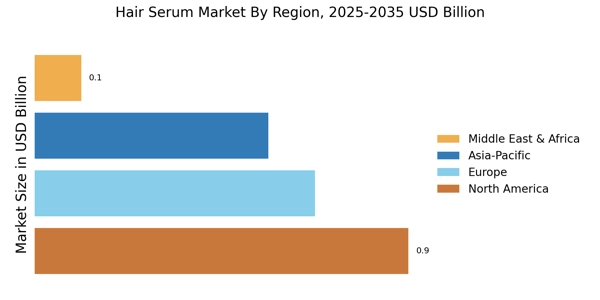The Hair Serum Market is currently characterized by a dynamic competitive landscape, driven by innovation, consumer demand for quality, and a growing emphasis on sustainability. Major players such as L'Oreal (France), Procter & Gamble (US), and Unilever (GB) are at the forefront, each adopting distinct strategies to enhance their market presence. L'Oreal (France) has focused on expanding its product lines with a strong emphasis on natural ingredients, appealing to the increasing consumer preference for clean beauty. Meanwhile, Procter & Gamble (US) has been leveraging digital transformation to enhance customer engagement and streamline its supply chain, thereby improving operational efficiency. Unilever (GB) has also been active in regional expansion, particularly in emerging markets, where it seeks to capture a larger share of the growing demand for hair care products. Collectively, these strategies contribute to a competitive environment that is both fragmented and concentrated, with key players vying for market share through innovation and strategic positioning. In terms of business tactics, companies are increasingly localizing manufacturing to reduce costs and improve supply chain resilience. This approach not only enhances responsiveness to local market demands but also aligns with sustainability goals by minimizing transportation emissions. The Hair Serum Market appears moderately fragmented, with several key players dominating while allowing room for niche brands to thrive. The collective influence of these major companies shapes market dynamics, as they set trends that smaller players often follow. In August 2025, L'Oreal (France) announced the launch of a new line of hair serums infused with sustainably sourced botanical extracts. This strategic move underscores L'Oreal's commitment to sustainability and innovation, positioning the brand as a leader in the clean beauty segment. By tapping into the growing consumer demand for eco-friendly products, L'Oreal aims to enhance its market share and strengthen brand loyalty among environmentally conscious consumers. In September 2025, Procter & Gamble (US) unveiled a new digital platform designed to personalize hair care recommendations based on individual hair types and concerns. This initiative reflects the company's focus on digital transformation and customer-centricity, allowing it to engage consumers more effectively. By utilizing data analytics and AI, Procter & Gamble seeks to differentiate its offerings in a crowded market, potentially leading to increased sales and customer satisfaction. In July 2025, Unilever (GB) entered into a strategic partnership with a local beauty tech startup to co-develop innovative hair care solutions tailored for the Asian market. This collaboration highlights Unilever's strategy of leveraging local expertise to enhance product relevance and appeal. By aligning with regional trends and consumer preferences, Unilever aims to solidify its position in a rapidly growing market segment. As of October 2025, the Hair Serum Market is witnessing trends that emphasize digitalization, sustainability, and the integration of AI technologies. Strategic alliances are increasingly shaping the competitive landscape, enabling companies to pool resources and expertise for enhanced innovation. Looking ahead, competitive differentiation is likely to evolve, with a pronounced shift from price-based competition to a focus on innovation, technology, and supply chain reliability. Companies that can effectively navigate these trends will likely emerge as leaders in the market.
.png)

















